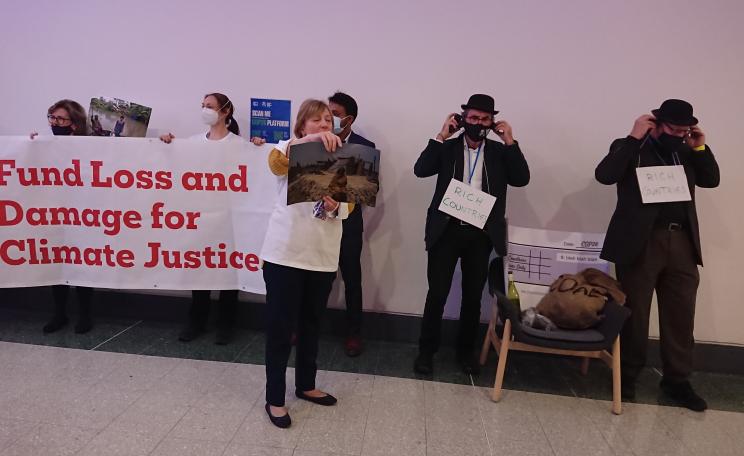Teachers are crucial to find new ways for developing the hard and soft skills needed in tomorrow's society.
Secondary school children in the UK and around the world will this week become part of a student-led movement demanding that governments introduce integrated, mandatory, and assessed climate education into national curriculums.
The Teach the Teacher campaign running across 20 countries throughout October sees students from across the globe reverse roles with their teachers and provide lessons with up-to-date climate science which reflects the urgency of the climate crisis.
Despite many governments committing to make climate action and adaptation a national priority, climate education is still barely covered in the school curriculum. The lack of information and solution-based learning is causing escalating levels of anxiety for young people.
Study
Last week, the largest study ever conducted into the effects of the climate crisis on the mental health of young people revealed nearly half of young people globally feel climate anxiety negatively affects their daily life.
It also found that almost two-thirds of young people around the world believe governments are not doing enough to protect them from climate change.
The Teach the Teacher campaign was created by an international group of student organisers from Mock COP and SOS-UK and seeks to tackle inadequate levels of climate education globally and is urging governments to act on the issue as world leaders convene in Glasgow, UK, for COP26.
As well as reflecting the urgency of the climate crisis, students from the Teach the Teacher campaign are demanding that curriculums focus on climate related solutions, to help mitigate rising levels of eco-anxiety in young people.
Aishwarya Puttur, from Teach the Teacher, said: “Education for all is a human right, and education about a crisis that is currently upon us and will affect each and every one of us is also a right. Climate change education should no longer be a privilege but rather something that is available to all.
Support
"It must be one that includes the intersections of the climate crisis, states scientific facts as it is, has frontline defenders and marginalised people’s voices heard and explains how we can make sustainable changes and take action.”
Supported by the Teach the Teacher global network, students will take on the role of the teacher and present a lesson which has been tabled into the school week.
Classes will focus on issues including climate education, climate justice and how to start a climate conversation in the classroom.
Schools across 21 countries will take part, including those particularly at risk from the damaging effects of climate change such as Bangladesh, India and Ecuador.
The campaign has received support from a range of global political figures including Lorenzo Fioramonti, former Italian Minister of Public Education and Jimmy Uguro, Minister for Education, Papua New Guinea.
Teachers are crucial to find new ways for developing the hard and soft skills needed in tomorrow's society.
Ideal
Lorenzo Fioramonti, former Italian Minister of Public Education said: "Addressing climate change and environmental collapse requires a profound behavioral revolution, which can only be achieved through adequate interdisciplinary and systems-based education.
"In this quest, teachers are crucial to find new ways for developing the hard and soft skills needed in tomorrow's society.
"By bringing together educators and students, Teach the Teacher is creating the ideal platform for training and empowering school communities in this exciting but challenging journey."
Teach the Teacher is being launched five weeks before the start of COP26 in Glasgow. The launch is intended to encourage meaningful action and policy outcomes at the COP26 Education Ministers Summit, scheduled to take place on Youth Day (5th November).
The Summit will bring both climate and education ministers together, encouraging global collaboration to ensure better climate education.
Awareness
With commitments made by the UK government to make COP26 the most inclusive COP ever, Youth Day will provide young activists with an opportunity to highlight the ways in which climate education can be improved to support future generations and urgent climate action.
The most recent IPCC report identified the unequivocal influence of humans on our planet.
Without urgent action the IPCC predicts that sea levels will rise by 20cm by 2030 and extreme weather events will rapidly increase affecting global and local food security.
Article 12 of the Paris Agreement states the importance of climate education, training, public awareness, public participation and public access to information in order to limit global temperature rises to 1.5 degrees celsius.
Policies
The Agreement asks all Parties to cooperate in taking appropriate measures to implement this.
Italy, co-host of COP26, has enhanced its commitment to climate education, being the first country in the world to make it a legal requirement for all students.
Other countries have also started to introduce climate education policies, such as New Zealand which has introduced an optional climate curriculum and Mexico which amended its constitution to include an understanding of and respect for the natural world as a basic requirement of education.
This Author
Ruby Harbour is the editorial assistant at The Ecologist. To find out more about Teach the Teacher visit its website. There will be a Teach the Teacher webinar taking place at 11am on Monday, 4 October 2021 on the Mock COP26 YouTube channel.







